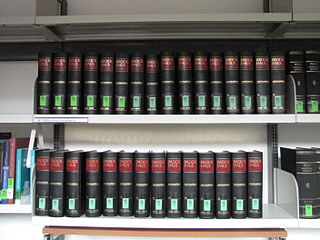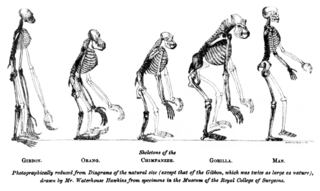
The brown bear is a bear that is found across much of northern Eurasia and North America. In North America the population of brown bears are often called grizzly bears. It is one of the largest living terrestrial members of the order Carnivora, rivaled in size only by its closest relative, the polar bear, which is much less variable in size and slightly larger on average.

A reference work is a book or periodical to which one can refer for information. The information is intended to be found quickly when needed. Reference works are usually referred to for particular pieces of information, rather than read beginning to end. The writing style used in these works is informative; the authors avoid use of the first person, and emphasize facts. Many reference works are compiled by a team of contributors whose work is coordinated by one or more editors rather than by an individual author. Indices are commonly provided in many types of reference work. Updated editions are usually published as needed, in some cases annually. Reference works include dictionaries, thesauruses, encyclopedias, almanacs, bibliographies, and catalogs. Many reference works are available in electronic form and can be obtained as application software, CD-ROMs, DVDs, or online through the Internet.

The California Gold Rush (1848–1855) began on January 24, 1848, when gold was found by James W. Marshall at Sutter's Mill in Coloma, California. The news of gold brought approximately 300,000 people to California from the rest of the United States and abroad. The sudden influx of gold into the money supply reinvigorated the American economy, and the sudden population increase allowed California to go rapidly to statehood, in the Compromise of 1850. The Gold Rush had severe effects on Native Californians and resulted in a precipitous population decline from disease, genocide and starvation. By the time it ended, California had gone from a thinly populated ex-Mexican territory, to having one of its first two U.S. Senators, John C. Frémont, selected to be the first presidential nominee for the new Republican Party, in 1856.
Physical Review is an American peer-reviewed scientific journal established in 1893 by Edward Nichols. It publishes original research as well as scientific and literature reviews on all aspects of physics. It is published by the American Physical Society (APS). The journal is in its third series, and is split in several sub-journals each covering a particular field of physics. It has a sister journal, Physical Review Letters, which publishes shorter articles of broader interest.

Impatiens is a genus of more than 1,000 species of flowering plants, widely distributed throughout the Northern Hemisphere and the tropics. Together with the genus Hydrocera, Impatiens make up the family Balsaminaceae.

Oliver Napoleon Hill was an American self-help author. He is known best for his book Think and Grow Rich (1937) which is among the 10 best selling self-help books of all time. Hill's works insisted that fervid expectations are essential to improving one's life. Most of his books were promoted as expounding principles to achieve "success".

Courtney Bernard Vance is an American actor notable for his roles in the feature films Hamburger Hill and The Hunt for Red October, the television series Law & Order: Criminal Intent, in which he played Assistant District Attorney Ron Carver and The People v. O. J. Simpson: American Crime Story, in which he played Johnnie Cochran. For the latter, he won the Primetime Emmy Award for Outstanding Lead Actor in a Limited Series or Movie. He guest starred on the TNT series The Closer as Chief Tommy Delk from 2010–11. In 2013, he won a Tony Award for Best Featured Actor in a Play for his role in Lucky Guy.

"Away in a Manger" is a Christmas carol first published in the late nineteenth century and used widely throughout the English-speaking world. In Britain, it is one of the most popular carols; a 1996 Gallup Poll ranked it joint second. Although it was long claimed to be the work of German religious reformer Martin Luther, the carol is now thought to be wholly American in origin.

Forest Hills Cemetery is a historic 275-acre (111.3 ha) cemetery, greenspace, arboretum and sculpture garden located in the Forest Hills section of the Jamaica Plain neighborhood of Boston, Massachusetts. The cemetery was established in 1848 as a public municipal cemetery of the town of Roxbury, but was privatized when Roxbury was annexed to Boston.

The genus Bassaricyon consists of small Neotropical procyonids, popularly known as olingos. They are native to the rainforests of Central and South America from Nicaragua to Peru. They are arboreal and nocturnal, and live at elevations from sea level to 2,750 m. Olingos closely resemble the kinkajou in morphology and habits, though they lack prehensile tails and extrudable tongues, have more extended muzzles, and possess anal scent glands. They also resemble galagos and certain lemurs, which are primates.

Introduction to Algorithms is a book by Thomas H. Cormen, Charles E. Leiserson, Ronald L. Rivest, and Clifford Stein. The book has been widely used as the textbook for algorithms courses at many universities and is commonly cited as a reference for algorithms in published papers, with over 10,000 citations documented on CiteSeerX. The book sold half a million copies during its first 20 years. Its fame has led to the common use of the abbreviation "CLRS", or, in the first edition, "CLR".
Richard Eugene Nisbett is an American social psychologist and writer. He is the Theodore M. Newcomb Distinguished Professor of social psychology and co-director of the Culture and Cognition program at the University of Michigan at Ann Arbor. Nisbett's research interests are in social cognition, culture, social class, and aging. He received his Ph.D. from Columbia University, where his advisor was Stanley Schachter, whose other students at that time included Lee Ross and Judith Rodin.

Joseph Hillstrom King, better known by the pen name Joe Hill, is an American author and comic book writer. His work includes the novels Heart-Shaped Box (2007), Horns (2010), NOS4A2 (2013), and The Fireman (2016); the short story collections 20th Century Ghosts (2005) and Strange Weather (2017); and the comic book series Locke & Key (2008–2013). Locke & Key won British Fantasy Awards in 2009 and 2012, and an Eisner Award in 2012.
David J. Garrow is an American historian and author of the book Bearing the Cross: Martin Luther King, Jr., and the Southern Christian Leadership Conference (1986), which won the 1987 Pulitzer Prize for Biography. He also wrote Liberty and Sexuality (1994), a history of the legal struggles over reproductive rights in the U.S. prior to the Roe v. Wade decision, Rising Star: The Making of Barack Obama (2017), and other works.
Hill is a surname of English origin, meaning "a person who lived on a hill", or derived from the Greek or Latin name Hilary or Hillary. It is the 36th most common surname in England and 37th most common in the United States.

Necrophilia, also known as necrophilism, necrolagnia, necrocoitus, necrochlesis, and thanatophilia, is a sexual attraction or sexual act involving corpses. It is classified as a paraphilia by ICD10 published by WHO and the Diagnostic and Statistical Manual (DSM) of the American Psychiatric Association.
Edgar Bright Wilson Jr. was an American chemist.

Blue Hill is a town in Hancock County, Maine, United States. The population was 2,686 at the 2010 census. It is home to the Blue Hill Public Library, Blue Hill Memorial Hospital, George Stevens Academy, the Blue Hill Harbor School, New Surry Theatre, Kneisel Hall, Bagaduce Music Lending Library, the Kollegewidgwok Yacht Club, the Marine & Environmental Research Institute, and the Blue Hill Country Club. A community on Blue Hill Bay, the town is the site of the annual Blue Hill Fair.
The International Divine Science Association was founded in 1892 in San Francisco, California by religious leader and author Malinda Cramer. The association was "founded for the promulgation of Divine Science, the God idea of perfect unity, harmony and wholeness, associated together in a unity of spirit, for the healing of nations, and the general good of humanity."
















